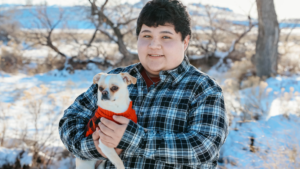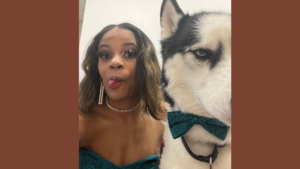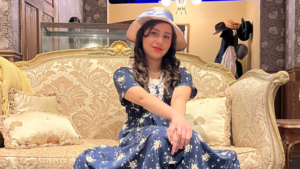This guest post is by Olivette Copple, a young woman who is diagnosed with autism and plans to attend the University of Montana. Olivette is applying for the Spring 2024 Making a Difference Autism Scholarship via the nonprofit KFM Making a Difference started by me, Kerry Magro. I was nonverbal till 2.5 and diagnosed with autism at 4, and you can read more about my organization here. Autistics on Autism: Stories You Need to Hear About What Helped Them While Growing Up and Pursuing Their Dreams, our nonprofit’s new book, was released on March 29, 2022, on Amazon here for our community to enjoy featuring the stories of 100 autistic adults.
A beam of sunlight permeated the mangrove canopy, shining down upon a rock in the middle of the swamp where a juvenile Alligator Mississippians basked its scales. I sat perfectly still at a school desk, entranced with the reptile before me. Suddenly, a command from my teacher shattered the daydream, “FOCUS!” I duly picked at the piece of paper taped to my desk, staring at that same word printed in a bright, bouncy font: FOCUS. It was not particularly shocking that this paper badge of shame, nor the commands to pay attention, was actually a detriment to my focus.
Most of my school years were spent figuring out how to avoid getting in trouble, stop my mind from forgetting lessons, and preventing the foggy, typically reptile-themed daydreams from enveloping me during a lecture. Socially, I tried my best, but I felt like an alien that was dropped into the world. I scripted every conversation before it happened, mirrored how people acted, and was always conscious of if my emotions played across my face in the right way and came through my voice in the right tone, often to no avail. However, despite masking, pretending, and shame, I always had alligators. Of course, it wasn’t always alligators; sometimes it was bats or reading or, now, computer science and biochemistry, but there was always some intense passion motivating me to wake up in the morning.
Two revelations finally came to me that explained why I could focus so intensely on alligators but be completely unable to listen to a math lesson. First, I was diagnosed with ADHD. Thankfully, a light at the end of the learning struggle tunnel was ignited as I started my treatment journey. Not only do I now have the energy and motivation to complete tasks most deem basic, but now I genuinely enjoy going to school. I can approach learning positively and preparedly because retaining information and staying focused on a topic no longer feels like chores. I don’t have to force myself to FOCUS because listening and attention now come naturally to me.
Second, I recently learned that I am Autistic. This condition isn’t handled like ADHD; there is no medicine or therapy to “cure” autism. Not that I would ever want there to be– there is a long and dark history of non-autistics trying to “fix” us that should never be repeated. Some may assume that because there is no “cure”, there is no point in “labeling” a person as Autistic. In my experience, this couldn’t be further from the truth- although this diagnosis can’t change my past experiences, it reframed them and put my whole childhood into a new perspective. It told me that I wasn’t faulty or broken for my struggles to interact socially, I wasn’t weak for being unable to handle loud noises and bright sunlight, and my all-consuming interests in various topics weren’t simply odd phases–it was the way my brain and nervous system were set up on a systematic level that dictated this behavior and made me, me.
My favorite thing about autism is that I can think monotropically: my focus is streamlined in an intense channel at whatever topic or passion grips me. When I am interested in a subject, my whole world melts away. The only negative side of this focused state is that I am very intolerant of interruptions, whether they be sensory or just the general demands of life. My special interests were an oasis of tranquility throughout my life, and today, they provide me with an escape whenever I feel burnt out, excluded, or overstimulated. While the Diagnostic and Statistical Manual of Mental Disorders may consider my degree of passion to be “abnormal”, having a special interest (as those in the autistic community call it) is a source of joy like no other.
At the end of the day, everyone has a passion. Maybe differently from how I feel passion, perhaps not to “an abnormal intensity or focus”, but I believe everyone, Autistic or not, can learn and can enjoy the learning process. Psychologists would call this feeling self-actualization, the idea that this desire to understand and follow our passions greatly motivates us and may even be the elusive point of life. Even when I struggle with symptoms of ADHD, get overstimulated, or feel socially outcast, I know that shame and embarrassment are never good motivators. The best way to overcome these feelings and reach self-actualization is by letting my passions and desire to learn take the lead.
Follow my journey on Facebook, my Facebook Fan Page, Tiktok, Youtube & Instagram.
My name is Kerry Magro, a professional speaker and best-selling author who is also on the autism spectrum. I started the nonprofit KFM Making a Difference in 2011 to help students with autism receive scholarship aid to pursue post-secondary education. Help support me so I can continue to help students with autism go to college by making a tax-deductible donation to our nonprofit here.
Autistics on Autism: Stories You Need to Hear About What Helped Them While Growing Up and Pursuing Their Dreams was released on March 29, 2022 on Amazon here for our community to enjoy featuring the stories of 100 autistic adults. 100% of the proceeds from this book will go back to our nonprofit to support initiatives like our autism scholarship program. In addition, this autistic adult’s essay you just read will be featured in a future volume of this book as we plan on making this into a series of books on autistic adults.














